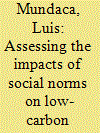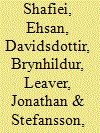| Srl | Item |
| 1 |
ID:
183577


|
|
|
|
|
| Summary/Abstract |
Policymakers and scientists are paying increasing attention to how social norms can promote pro-environmental behaviour and sustainable energy use. We contribute to this field by experimenting with and assessing the impacts of social norms on low-carbon mobility options. Taking Sweden as a case study, we develop two complementary randomised controlled experiments to: 1) analyse the role of social norms in promoting the adoption of car sharing services (CSS) via descriptive and injunctive norms (N = 720); and 2) investigate potential crowd out effects when injunctive norms are used to promote a low-carbon transport hierarchy (N = 730). First-order effects show that social norms have a positive but marginal impact on the willingness to adopt CSS, and only injunctive norms have the potential to steer behaviour in the desired direction. Results also suggest that concerns about potential substitution effects between low-carbon transport options and CSS are not valid. With due limitations, our findings have various implications for policymaking, notably that for social norms to be effective, other policy instruments are critically needed. Of particular importance are the environmental effectiveness of CSS and complementarities between public transport and active mobility (i.e. walking and cycling).
|
|
|
|
|
|
|
|
|
|
|
|
|
|
|
|
| 2 |
ID:
132649


|
|
|
|
|
| Publication |
2014.
|
| Summary/Abstract |
This paper develops a system dynamics model of Iceland×s energy sector (UniSyD_IS) that is based on the UniSyD_NZ model of New Zealand×s energy economy. The model focuses on the energy supply sector with endogenous representation of road transport energy demand. Equilibrium interactions are performed across electricity, hydrogen, biofuels, and road transport sectors. Possible transition paths toward a low-carbon transport in Iceland are explored with implications for fuel demand, greenhouse gas (GHG) emissions and associated costs. The consumer sector simulates the long-term evolution of light and heavy-duty vehicles through a vehicle choice algorithm that accounts for social influences and consumer preferences. Through different scenarios, the influences of four fundamental driving factors are examined. The factors are oil price, carbon tax, fuel supply-push, and government incentives. The results show that changes in travel demand, vehicle technologies, fuel types, and efficiency improvements can support feasible transition paths to achieve sufficient reduction in GHG for both 4 °C and 2 °C climate scenarios of the Nordic Energy Technology Perspectives study. Initial investment in supply infrastructure for alternative fuels will not only mitigate GHG emissions, but also could provide long-term economic benefits through fuel cost saving for consumers and reduced fuel import costs for government
|
|
|
|
|
|
|
|
|
|
|
|
|
|
|
|